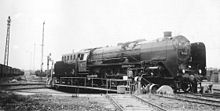Repair shop
Repair shops are used for the maintenance of rail vehicles or their components. In contrast to railway depots , which take on everyday, smaller jobs primarily to ensure immediate operational readiness, repair shops specialize in major repairs, general inspections and reconditioning replacement parts. In addition, vehicles are converted and modernized and, in individual cases, new rail vehicles are built. In addition to maintaining the vehicles, some repair shops also make switches , build signal bridges, platform roofs and similar steel structures. Depending on the specialization of the repair works, one speaks of passenger car works (maintenance of passenger cars ), freight car works (maintenance of freight wagons ) and switch works (manufacture of switches).
Term in history and region
Depending on the region, railway company and historical context, repair shops were also referred to with different terms. The term Centralwerkstätte was particularly common in the first decades of the railway industry . In Austria and on many private railways , one speaks of main workshops . The DB AG uses the term work . The Deutsche Reichsbahn introduced the term Eisenbahnausbesserungswerk (EAW) in 1924 and Reichsbahnausbesserungswerk (Raw / RAW) in 1927 . This term was used by the Deutsche Reichsbahn until 1993.
Buildings and technical systems
The structural center of a repair shop is usually a large, multi-track assembly hall in which several work stations allow several rail vehicles to be repaired at the same time. The work stations are equipped with hoists to jack up vehicles and separate the car bodies from the chassis . Attached to the execution hall are mechanical and electrotechnical workshops for the reconditioning of individual parts such as chassis, brake fittings and motors. The exterior painting of the rail vehicles is done in a paint shop separated from the assembly hall.
The works
With the expansion of railway networks of the railway from the mid-19th century was a variety of maintenance workshops throughout the German-speaking area. Due to the transition from the maintenance-intensive steam operation to the more maintenance-friendly electric and diesel traction, as well as the increasing rationalization of workshop operations, the number of repair shops required has been significantly reduced. In the course of specialization, Deutsche Bahn now operates its repair shops with the following focuses:
| Plant and place | Abbreviation | Jurisdiction |
|---|---|---|
| Witten turnout factory | EWT X | Switches |
| Signal plant in Wuppertal | Control and safety technology | |
| AW Fulda | FFU X | Brake parts of rail vehicles |
| Meiningen steam locomotive works | UM X | Steam locomotives, historic wagons , snow clearing technology and railway cranes |
| AW Cottbus | BCS X | Diesel locomotives |
| AW Bremen | HB X | Diesel locomotives and diesel engines |
| AW Kassel | FK X | Diesel railcars |
| AW Dessau with branch in Chemnitz | LD X | Electric locomotives |
| AW Krefeld-Oppum | KKRO X | Electric multiple units |
| AW Nuremberg | NN X NNR X |
Electric multiple units |
| AW Neumünster | TO X | Passenger coaches |
| AW Wittenberge | WW X | Passenger carriages, wheelsets |
| AW Paderborn-Nord | EPD X | Freight wagons |
| Main workshop in Berlin-Schöneweide | BSWS X | S-Bahn Berlin |
| BW Hamburg-Ohlsdorf | AOP X AOPS X |
S-Bahn Hamburg |
In addition to Deutsche Bahn AG, the Austrian Federal Railways , the Swiss Federal Railways and larger private railways also operate their own main workshops. In Weiden , Stendal , Delitzsch , Leipzig, Kaiserslautern and Halberstadt, former repair shops of Deutsche Bahn AG and its predecessors were transferred to private sponsorship.
A private repair shop in Unterhausen near Neuburg an der Donau repairs freight wagons, mainly tank wagons .
Main local transport workshops
Main workshops for rail vehicles are not only in railways but also in metro , urban and trams . Due to the comparatively small number of vehicles to be serviced, the main workshops are in most cases attached to tram depots. An example is the main workshops of the Wiener Linien , where metro, tram and train the local train and buses are maintained and repaired.
Former repair shops in Germany


In addition to the repair shops still in operation, Deutsche Bahn AG and its predecessors had repair shops and main workshops at the following locations:
|
|
Web links
- Overview of the repair shops of the Deutsche Bahn AG
- Overview of the Reichsbahn repair works in the GDR and in Berlin
- Overview of the Reichsbahn repair works 1932 ( Memento from January 15, 2008 in the Internet Archive )
supporting documents
- ↑ Abbreviation according to Directive 100 for address on the vehicle
- ↑ Abbreviation at bahnstatistik.de
- ↑ Location of the KED workshops around 1900 on a city map in Berlin-Friedrichshain ( page no longer available , search in web archives ) Info: The link was automatically marked as defective. Please check the link according to the instructions and then remove this notice.


